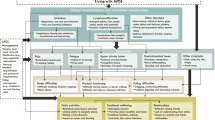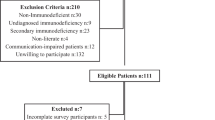Abstract
Some research teams have investigated the impact of primary immunodeficiencies (PIDs) on the quality of life of people diagnosed with them. According to the literature, some variables would play a significant role in the quality of life self-reported by people with PIDs; among these is the presence of a social support network. Therefore, we have chosen to address the issue of PIDs, starting from how the different actors of the social network contribute to generating the experience of those affected by PIDs. In particular, the objective of our research was twofold: to explore the discourses that contribute to building the experience lived by the person with PIDs and to explore ways of managing the disease. The texts collected were analyzed according to the Methodology of Textual Analysis of Computerized Data (MADIT). From the results, it emerges that a person with PIDs describes themselves and is described by others mainly as a patient, and the different aspects of their life are traced back to the pathology. People with PIDs and often their whole support network live the relationship with the disease in a passive way. Thus, the disease is suffered and not managed, for example, by practicing other social roles. We underline the importance of counteracting the admixture of organic pathology and psychological experience and the implementation of interventions that allow people with PIDs to live experiences and practice roles using which a person can be healthy (psychological and relational dimensions), even in the presence of a serious illness (organic dimension).
Similar content being viewed by others
Data Availability
All data generated or analyzed during this study are included in this published article (and its supplementary information files).
References
Adamo, S. M. G., & Pignata, C. (2016). Sentinelle traditrici. Un approccio integrato alla cura dei bambini con patologie del sistema immunitario. Milano: Franco Angeli.
Bousfiha, A. A., Jeddane, L., Ailal, F., Benhsaien, I., Mahlaoui, N., Casanova, J. L., & Abel, L. (2013). Primary immunodeficiency diseases worldwide: More common than generally thought. Journal of Clinical Immunology, 33(1), 1–7.
Canessa, C., Lippi, F., Ghiori, F., Ricci, S., Perone, V., Laudani, E., & Azzari, C. (2010). Terapia sostitutiva con immunoglobuline per via sottocutanea nei pazienti con deficit anticorpale primitivo: basi teoriche ed esperienza del nostro centro. Rivista di Immunologia e Allergologia Pediatrica, 3, 19–26.
Casanova, J. L., Fieschi, C., Zhang, S. Y., & Abel, L. (2008). Revisiting human primary immunodeficiencies. Journal of Internal Medicine, 264(2), 115–127.
Chapel, H., Prevot, J., Gaspar, H. B., Español, T., Bonilla, F. A., Solis, L., & Drabwell, J. (2014). Primary immune deficiencies–principles of care. Frontiers in Immunology, 5, 627. https://doi.org/10.3389/fimmu.2014.00627.
Colaianni, L., & Ciardiello, P. (2012). Cambiamo discorso. Diagnosi e Counselling nell'Intervento sociale secondo la scienza dialogica. Milano: Angeli.
Faccio, E. (2011). What works with individuals in a clinical setting? Frontiers in Psychology, 2, 2. https://doi.org/10.3389/fpsyg.2011.00002.
Gardulf, A., Bjorvell, H., Gustafson, R., Hammarström, L., & Smith, C. I. E. (1993). The life situations of patients with primary antibody deficiency untreated or treated with subcutaneous gammaglobulin infusions. Clinical & Experimental Immunology, 92, 200–204.
Gardulf, A., Bjorvell, H., Andersen, V., Bjorkander, J., Ericson, D., Frøland, S. S., et al. (1995). Lifelong treatment with gammaglobulin for primary antibody deficiencies: The patients' experiences of subcutaneous self-infusions and home therapy. Journal of Advanced Nursing, 21, 917–927.
Gardulf, A., Nicolay, U., Asensio, O., Bernatowska, E., Böck, A., Costa-Carvalho, B. T., et al. (2004). Children and adults with primary antibody deficiencies gain quality of life by subcutaneous IgG self-infusions at home. Journal of Allergy and Clinical Immunology, 114, 936–942.
Hagerty, M. R., Cummins, R., Ferriss, A. L., Land, K., Michalos, A. C., Peterson, M., & Vogel, J. (2001). Quality of life indexes for national policy: Review and agenda for research. Bulletin of Sociological Methodology/Bulletin de Méthodologie Sociologique, 71(1), 58–78.
Harré, R. & Gillett, G. (1994). The discursive mind. Sage Publications.
Henderson, S., Horne, M., Hills, R., & Kendall, E. (2018). Cultural competence in healthcare in the community: A concept analysis. Health & Social Care in the Community, 26(4), 590–603.
Iudici, A. (2015). Health promotion in school: Theory, practice and clinical implications. New Nova.
Iudici, A., Bertoli, L., & Faccio, E. (2017b). The ‘invisible’ needs of women with disabilities in transportation systems. Crime Prevention and Community Safety, 19(3–4), 264–275.
Iudici, A., & Renzi, C. (2015). The configuration of job placement for people with disabilities in the current economic contingencies in Italy: Social and clinical implications for health. Disability and Health Journal, 8(4), 586–593. https://doi.org/10.1016/j.dhjo.2015.06.004.
Iudici, A., & Gagliardo Corsi, A. (2017). Evaluation in the field of social services for minors: Measuring the efficacy of interventions in the Italian service for health protection and promotion. Evaluation Program Planning, 61, 160e168–160e168. https://doi.org/10.1016/j.evalprogplan.2016.11.016.
Iudici, A., Favaretto, G., & Turchi, G. P. (2018). Community perspective: How volunteers, professionals, families and the general population construct disability: Social, clinical and health implications. Disablity and Health Journal, Vol. 12, Issue 2, Pages 171–179. ISSN: 1936-6574, Doi: https://doi.org/10.1016/j.dhjo.2018.11.014.
Iudici, A., Alborghetti, E., & Ferri, C. (2017a). Mediation as a restorative justice tool: Applications in the Italian juvenile judicial context, pages 221-226. In: Evans Jessica, ed. Restorative and transitional justice: Perspectives, Progress and considerations for the future. New York: Nova Science Publishers.
Lim, J. W., & Zebrack, B. (2006). Social networks and quality of life for long-term survivors of leukemia and lymphoma. Supportive Care in Cancer, 14(2), 185–192.
Lin, S., Liu, D., Liu, W., Hui, Q., Cortina, K. S., & You, X. (2018). Mediating effects of self-concept clarity on the relationship between passive social network sites use and subjective well-being. Current Psychology, 1–8. https://doi.org/10.1007/s12144-018-0066-6.
Kroenke, C. H., Kwan, M. L., Neugut, A. I., Ergas, I. J., Wright, J. D., Caan, B. J., et al. (2013). Social networks, social support mechanisms, and quality of life after breast cancer diagnosis. Breast Cancer Research and Treatment, 139(2), 515–527.
Mawson, E., Best, D., Beckwith, M., Dingle, G. A., & Lubman, D. I. (2015). Social identity, social networks and recovery capital in emerging adulthood: A pilot study. Substance Abuse Treatment, Prevention, and Policy, 10(1), 45.
Mcgregor, J., Mercer, S. W., & Harris, F. M. (2018). Health benefits of primary care social work for adults with complex health and social needs: A systematic review. Health & Social Care in the Community, 26(1), 1–13.
Moos, R.H. (2011). Processes that promote recovery from addictive disorders. In: Kelly, J.F., white, W.L., & Totowa, N.J. Addiction recovery management: Theory, research and practice. USA: Humana press.
Nicolay, U., Kiessling, P., Berger, M., Gupta, S., Yel, L., Roifman, C. M., Gardulf, A., Eichmann, F., Haag, S., Massion, C., & Ochs, H. D. (2006). Health-related quality of life and treatment satisfaction in north American patients with primary immunedeficiency diseases receiving subcutaneous IgG self-infusions at home. Journal of Clinical Immunology, 26(1), 65–72.
Plebani, A., & Notarangelo, L. D. (2008). Vecchie e nuove immunodeficienze. Prospettive in Pediatria, 38(149–150), 73–80.
Rezaei, N., Aghamohammadi, A., & Notarangelo, L. D. (2008). Primary immunodeficiency diseases: Definition, diagnosis, and management. Berlin: Springer Science & Business Media.
Ross, F., Smith, P., Byng, R., Christian, S., Allan, H., Price, L., & Brearley, S. (2014). Learning from people with long term conditions: New insights for governance in primary healthcare. Health & Social Care in the Community, 22(4), 405–416.
Salvini, A. (2004). Argomenti di Psicologia Clinica. Padova: Upsel.
Sigstad, H. M. H., Stray-Pedersen, A., & Frøland, S. S. (2005). Coping, quality of life, and hope in adults with primary antibody deficiencies. Health and Quality of Life Outcomes, 3, 31. https://doi.org/10.1186/1477-7525-3-31.
Sirgy, M. J. (2011). Theoretical perspectives guiding QOL Indicator projects. Social Indicators Research, 103, 1–22. https://doi.org/10.1007/s11205-010-9692-6.
Soares, A., Biasoli, I., Scheliga, A., Baptista, R. L., Brabo, E. P., Morais, J. C., Brabo, E. P., Morais, J. C., Werneck, G. L., & Spector, N. (2013). Association of social network and social support with health-related quality of life and fatigue in long-term survivors of Hodgkin lymphoma. Supportive Care in Cancer, 21(8), 2153–2159.
Turchi, G. P., & Della Torre, C. (2007). Psicologia della salute. Dal modello bio-psico-sociale al modello dialogico. Roma: Armando Editore.
Turchi, G. P., & Orrù, L. (2014). Metodologia per l'analisi dei dati informatizzati testuali: fondamenti di teoria della misura per la scienza dialogica. Napoli: Edises.
Turchi, G. P. (2002). Tossicodipendenza. Generare il cambiamento tra mutamento di paradigma ed Effetti pragmatici. Padova: Upsel.
Turchi, G. P., Iudici, A., & Faccio, E. (2019). From suicide due to an economic-financial crisis to the management of entrepreneurial health: Elements of a biographical change management service and clinical implications. Frontiers in Psychology, 10, 426. https://doi.org/10.3389/fpsyg.2019.00426.
Turchi, G. P., Celleghin, E., & Francato, S. (2012). Promozione della salute e politiche sociali. Il contributo di MADIT alla ricerca intervento nel comune di Abano Terme. Padova: Upsel Domeneghini Editore.
Ugazio, A. (2011). Le immunodeficienze primitive. Quaderni sulle immunodeficienze primitive, n.3, Brescia: AIP.
Vandervoort, D. (1999). Quality of social support in mental and physical health. Current Psychology, 18(2), 205–221.
Vandervoort, D. J., & Skorikov, V. B. (2002). Physical health and social network characteristics as determinants of mental health across cultures. Current Psychology, 21(1), 50–67.
Wittgenstein, L. (1953). Philosophische Untersuchunge. Oxford: Basil Blackwell.
Author information
Authors and Affiliations
Corresponding author
Ethics declarations
Conflict of Interest
All authors declare that they have no conflict of interest.
Ethical Approval
All procedures performed in studies involving human participants were in accordance with the ethical standards of the institutional and/or national research committee and with the 1964 Helsinki declaration and its later amendments or comparable ethical standards.
Informed Consent
Informed consent was obtained from all individual participants included in the study.
Additional information
Publisher’s Note
Springer Nature remains neutral with regard to jurisdictional claims in published maps and institutional affiliations.
Rights and permissions
About this article
Cite this article
Iudici, A., Filosa, E., Turchi, G. et al. Management of the Disease of primary Immunodeficiencies: an exploratory investigation of the discourses and clinical and social implications. Curr Psychol 41, 5925–5934 (2022). https://doi.org/10.1007/s12144-020-01092-6
Accepted:
Published:
Issue Date:
DOI: https://doi.org/10.1007/s12144-020-01092-6




